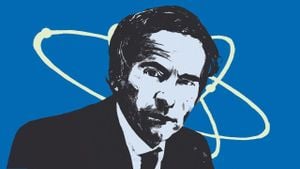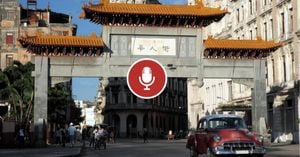Detroit's Mayor Mike Duggan has officially announced he will not seek reelection for his fourth term, marking the beginning of what many are calling a political shake-up for the city. During a heartfelt gathering at the Erma L. Henderson Auditorium on November 13, 2024, Duggan expressed gratitude to city employees and various supporters who have played significant roles throughout his twelve years of leadership. The atmosphere was charged with appreciation as the mayor outlined his vision for the remaining months of his administration, emphasizing the need to continue fostering growth and opportunity.
Reflecting on his time as mayor, Duggan noted, "Detroit's story of resurgence is one of Detroiters who never gave up on their city." This statement encapsulates the spirit he aimed to cultivate during his tenure, which began back in 2014, shortly after the city emerged from the largest municipal bankruptcy in U.S. history. Under his leadership, the focus has been on lowering crime rates, revitalizing neighborhoods, and reversing the decades-long trend of population decline.
Michigan's largest city has undergone notable changes during Duggan's administration. For the first time since the late 1950s, census data showed Detroit gained residents, albeit modestly—about 1,800 people from 2022 to 2023. The population, according to the U.S. Census Bureau, stood at roughly 633,218 this past year. Duggan has continuously emphasized the importance of growing the city's population, stating, "I want to change the direction of this city." His commitment to this goal highlighted his vision from day one, driving many of his policies and initiatives.
The decision not to seek reelection allows other potential candidates to step forward, creating what many are calling "a mayoral free-for-all." Already, several high-profile individuals have shown interest in claiming the mayoral seat. The list includes Council President Mary Sheffield and council members Fred Durhal III and Saunteel Jenkins. Businessman Joel Haashiim and other notable figures are also rumored to be contenders. The upcoming election, set for November 2025, is one to watch closely, as it will undoubtedly shape the future direction of Detroit.
Duggan’s successful reelections—a landslide victory securing 72% of the vote over Coleman Young II in 2017, followed by 75% against Anthony Adams in 2021—speak volumes about the trust the residents have placed in him. Nonetheless, some critics, like the advocacy group Detroit Action, have pointed out areas where they feel the mayor's administration has been lacking, particularly concerning support for low-income residents and those facing eviction.
The mayor’s exit opens doors to speculation about his future. Many political insiders expect Duggan to pursue the governorship when the opportunity arises after current Governor Gretchen Whitmer, who cannot run due to term limits, steps down. Although he remains tight-lipped about his aspirations, he hinted at sharing more details about his plans soon.
Duggan’s tenure has been characterized by bold initiatives aimed at revitalizing Detroit’s urban fabric. The year he took office, the streets were riddled with blight and crime, and the city was struggling to provide basic services—half the streetlights were non-functional. Today, tens of thousands of abandoned buildings have been demolished, and the administration has been focused on restoring city services. For example, the response times for emergency medical services (EMS) markedly improved from previously the worst to the best in the nation.
A focal point of Duggan's administration was the initiative called Motor City Match, which launched back in 2014. The program has provided extensive support, awarding around $19 million over the years via grants to over 2,100 small businesses. This substantial economic footprint reflects the mayor's efforts to encourage entrepreneurship and local economic development.
Despite facing significant challenges and criticism along the way, Duggan acknowledges the collective effort required for Detroit’s resurgence. He thanked city employees for their steadfastness, especially during the turbulent years of bankruptcy when many took pay cuts and remained committed to the city’s recovery. “You stuck with us,” Duggan stated, expressing his heartfelt gratitude and appreciation.
His recent announcement did not shy away from the deep-rooted racial dynamics prevalent during his campaign. Duggan recounted how, during his 2013 campaign, he often found himself as the only white face at community meetings. “Most times, I was the only White person in the room,” he shared, emphasizing the powerful conversations he had with residents about their histories and dreams for the city.
Looking back at his accomplishments, Duggan highlighted significant successes such as the historic drop in violent crime, decreased blight, and improved property values. He takes pride particularly in making neighborhoods safer and cleaner, ensuring more streets are lined with lights, and enhancing public parks, fostering community ownership and engagement.
Duggan's leadership style has been described as metrics-oriented, showing how he has embraced accountability as the backbone of his administration. The frequent updates and community celebrations highlighting various milestones reflect his approach to engaging citizens along the way. His administration held various events to celebrate hitting benchmarks such as new streetlights, cleared alleys, and affordable housing developments.
With many projects close to fruition, such as the Joe Louis Greenway—an extensive urban trail—Duggan remains optimistic about Detroit’s future. “There are projects on the way,” he assured, indicating the groundwork laid during his tenure would benefit future leadership.
While his successor will inherit several projects, Duggan's vision also extends to empowering the next group of leaders who will take the city forward. "I feel like there’s so much talent here," he noted, underscoring his belief the next mayor will be capable of continuing the momentum he has instilled.
Despite the difficulties and tough moments faced during his administration, including managing through the pandemic, the mayor stresses the importance of maintaining focus on development and growth. “Detroit's story is one of resilience and transformation,” he claimed, signaling his pride for the progress achieved over the decade under his watch.
The days leading up to Duggan's announcement were marked with speculation, considering his lack of campaign fundraising efforts for the upcoming election—a sign deemed significant by political analysts. Speculations around his gubernatorial ambitions began to swirl, igniting discussions on what potential candidates may rise to fill the void left by his departure.
The political arena of Detroit is poised for dynamic changes as the race leads up to 2025. Candidates will have to navigate the newly energized citizenry inspired by Duggan's efforts, as well as address the city’s continuing challenges and opportunities. While Duggan will conclude his time as mayor on January 1, 2026, his impact on the city will continue to resonate beyond his tenure as leaders take on the monumental task of carrying the torch forward.



